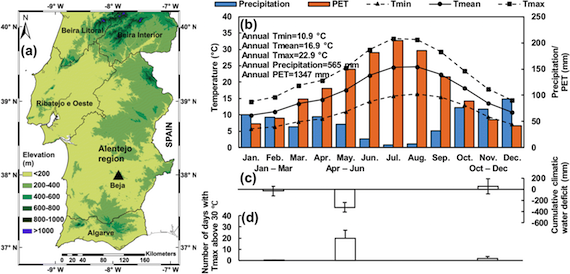Abstract
Projected warming and drying trends over the Mediterranean region represent a substantial threat for wheat production. The present study assesses winter wheat yield response to potential climate change and estimates the quantitative effectiveness of using early flowering cultivars and early sowing dates as adaptation options for the major wheat production region of Portugal. A crop model (STICS) is used for this purpose, which is calibrated for yield simulations before projecting future yields. Climate projections over 2021–2050 and 2051–2080 under two emission scenarios (RCP4.5 and RCP8.5) are retrieved from bias-adjusted datasets, generated by a ten-member climate model ensemble. Projected intensification of water deficits and more frequent high-temperature events during late spring (April–June), coinciding with the sensitive grain filling stage, primarily result in continuous mean yield losses (relative to 1981–2010) by − 14% (both scenarios) during 2021–2050 and by − 17% (RCP4.5) or − 27% (RCP8.5) during 2051–2080, also accompanied by increased yield variabilities. Of evaluated adaptation options at various levels, using earlier flowering cultivars reveals higher yield gains (26–38%) than that of early sowings (6–10%), which are able to reverse the yield reductions. The adopted early flowering cultivars successfully advance the anthesis onset and grain filling period, which reduces or avoids the risks of exposure to enhanced drought and heat stresses in late spring. In contrast, winter warming during early sowing window could affect vernalization fulfillment by slowing effective chilling accumulation, thus increasing the pre-anthesis growth length with limited effects on advancing reproductive stage. Crop yield projections and explored adaptation options are essential to assess food security prospects (availability and stability) of dry Mediterranean areas, providing crucial insights for appropriate policymaking.

Yang, C., Fraga, H., van Ieperen, W., Trindade, H., Santos, J.A. 2019. Effects of climate change and
adaptation options on winter wheat yield under rainfed Mediterranean conditions in southern Portugal.
Climatic Change 1–20. Go to article
